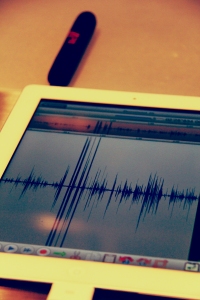OK, so as a voice talent I’m sure you have pet peeves – things your clients do that drive you crazy such as forgetting to provide pronunciations, horrible grammar/punctuation, last minute copy and so on… What about the talented producers that have to sit through our VO trax and edit them? The Imaging gurus at stations are also frequently the ones who decide or have very strong input as to which new Imaging Voice is hired. So, I thought I would ask a handful of quick questions from some of the hottest producers on the planet about the things they might have to say about VO talents. Here are the Producers:
 David Konsky – Today Network Image Production Manager/Southern Cross Austereo, Sydney, Australia
David Konsky – Today Network Image Production Manager/Southern Cross Austereo, Sydney, Australia
 Justin Case – Director of Programming and Imaging – Benztown
Justin Case – Director of Programming and Imaging – Benztown
 Mike Santos – Commercial Production Director – 97.1 AMP Radio Imaging Producer – Carson Daly Morning Show Production/Imaging Director – The Daly Download with Carson Daly-This Week’s Top 30
Mike Santos – Commercial Production Director – 97.1 AMP Radio Imaging Producer – Carson Daly Morning Show Production/Imaging Director – The Daly Download with Carson Daly-This Week’s Top 30
 Dan Gustafson – Founder/Producer/Sound Designer at Sonic Bliss Productions Rock Library Format Captain at Benztown Branding
Dan Gustafson – Founder/Producer/Sound Designer at Sonic Bliss Productions Rock Library Format Captain at Benztown Branding
What makes a particular voice talent standout as someone that’s easy to work with and provides great service? David: Takes well to direction Can and will improvise Quality Equipment Quick Turnaround Time Flexible with pickups Affordable Rates Justin: QUICK TURN AROUND!! Nowadays this is one of the most important assets to a producer. Everyone in the business is crazy busy and has so many different things going on, having a voiceover artist who is capable of turning around copy in a timely manner is such a HUGE help! I’ve worked with stations that have dropped VO talent because it would take them 3-4 days to turn around a half page of copy, ain’t nobody got time for that (said like that lady in the video!) Mike: Turnaround and communication for me are absolutely key when choosing talent. There are so many talented VO people out there and unless you’re looking for a big-name player for your station, a lot of them are interchangeable. So when it comes down to it, it’s all about turnaround and communication. Can you get me what I need in a reasonable amount of time, or am I going to have to wait a few days. Communication is major as well, because you’re working with this person constantly. We’re a team. It’s important as talent because you don’t have to guess as to what the producers are looking for, and it’s important for the producers because if something is delayed, we have an answer when the PD starts asking questions and we can figure out an alternative sooner rather than later. Dan: For me, I need to hear “The Love” for what they do. It’s not something you can teach or direct, but you can certainly hear it. For “Easy To Work With” I need someone who is approachable. If I receive a VO and would like something re-read for whatever reason, I need to feel like I’m not bothering the talent when I email them a request. For “Great Service” I don’t feel fast turnaround is paramount. If it’s pressing and I request that, it’s important, but things like wild takes, or when a talent has an alternate idea and adds that into the session, you know you’re working with someone who has “The Love”.
What are your pet peeves or things that drive you crazy when dealing with VO talents? David: Given majority of the VO artists I use are international, and time zone differences I will be definitive in style of read. Eg: dark, light, warm, comedy, pause and effect. If a voice artist sends one read, it gives little room to work with. Doesn’t take well to direction Only provide a processed version Doesn’t listen to pronunciations provided and then pickups are requested. Justin: I love outtakes; you get some great material from it, but do go over board. When you read the same line 15 times and deliver a 15 minute file for a promo or two, it can be a bit much. Another pet peeve is keeping everyone updated on your vacation time. Most are pretty good at this, but it’s a huge problem when you’re gone and don’t let anyone know that you’re enjoying the last days of summer for the next week without a mic! Dan:
- One-take wonders/rip and read. If a talent does this, it’s obvious to me that there’s not much love going into what they’re doing.
- When I receive a VO track that the talent edited, and parts of words are chopped off. Everyone should listen back to their work before they send it to a Producer.
- Inconsistent mic/processing chains. If we’re working together and have established your sound from you cutting tracks at your home studio, please don’t send me something from the station studio. Generally they’ll sound totally different and that can cause some serious headaches on my end.
Do you prefer to receive processed or unprocessed VO trax? David: Unprocessed – provided that the VO talent has invested in the right setup, the rest should be left to the producer to sweeten. I’ve heard some horror stories from voice talents that send unprocessed audio, and the audio producer massacres the compression and eq, so I understand why the want to send processed audio. Justin: I’d rather it be unprocessed (or very lightly processed), let’s me have full control over what I want to do with the voice. If you have a killer preset that you really like, send us both files. Filtered/unfilted etc. Mike: Personally, I prefer unprocessed VO tracks, that is, no post eqing/compression. I like to run my own processing from this side because not every airchain is the same. So what works for one station, may not work for another. I may listen to the processed tracks and try to emulate certain eq/compression settings, but for the most part, send me the raw audio… Dan: Generally I like things unprocessed, but a few people I work with, I really enjoy their processing so I’ll take it. As long as it’s something I can screw around with if I want to. I like to spend a little time with someone when I first start working with them to see what works best. I work with one guy who sends me three versions of his VO, full processing, filtered, and raw – that is really cool.
Do you prefer mp3’s (if so, what bitrate) or linear wav and aiff files? David: MP3 mono 320k, otherwise WAV. Justin: Seems that most everyone sends mp3, which is fine (256, 44100), but if you can spare the bandwidth and file size…it’s always good to have a nice, fat WAV on hand! Mike: I know there are a lot of people that lean one way or the other on this, but I’m not super particular here. As long as it’s high quality audio, go ahead and send me an mp3 or wav. Audio storage on my side isn’t really an issue, but you might have storage issues with your ftp or whatever. Like I said, as long as it’s high quality, we’re good. 128kbps mono mp3 (or 320kbps if you’re using PT), 320kbps stereo mp3 or uncompressed linear wav seem to be the defaults, so let’s stick to those. Dan: I like .wav files. I do think they sound a little better, but more importantly to me, it demonstrates that the talent cares about the quality level as much as I do – makes me feel all warm and tingly inside.
Do you prefer a handful of variations in inflections to your copy or would you rather the VO talent busted through just once or twice so editing is less time consuming for you? David: An experienced VO talent will always provide a couple of versions with varying inflections unless otherwise instructed. Justin: I love it when a voice talent gives me 2-3 takes of each line with some different inflection each time. Like I said before, don’t get crazy with too many variations, it gets a little ridiculous sometimes! The VO talent has no idea what we are going to do with it, and hell, sometimes we don’t either until we are knee deep. Try to feel the copy and notice where the hits, drop offs and other production techniques might be happening within the copy. Mike: I love variations/outtakes etc. Sometimes when I’m writing copy, that I get tunnel vision. All I see is how I think it should sound, so if you come up with something on the fly, I’m all for it. I might use it, I might not, but at least we’re having fun. I used to have a voice talent that would edit out all the outtakes and things and just sent me what I needed and I had to tell her to stop doing that. I wanna see where you go with what I’ve sent you. You never know…sometimes an outtake can take a promo in an entirely new direction, and not only make it different, but make it BETTER! Dan: If I send copy to a talent and they return it to me with the read I envisioned, awesome. But, if they return it to me with the read I envisioned, plus a few other reads with their own interpretations of the copy that I never envisioned, that’s even better.
Anything else you would like to add? David: Harry Legg – I still laugh when I hear the Jessica Simspon ID of hairy leg. Justin: Talk some smack to the producer in the file…throw a little one liner in there. Always nice to get a good laugh while sifting through hours of VO daily J Mike: I remember reading (or listening, I forget) to something that Cousin Deke did a few years ago and he said something that was very simple and very profound. It was something along the lines of “treat every station you voice, as if it’s the ONLY station you voice.” Whether it’s the major markets, or a tiny station in who knows where, you’ve been invited to be part of a team, a family, so be sure to treat it as such. You might find, that in the long run, it’ll pay off for you. Dan: There’s always someone out there that’s better than you – learn from them.
Thank you all for your time! Harry Legg









